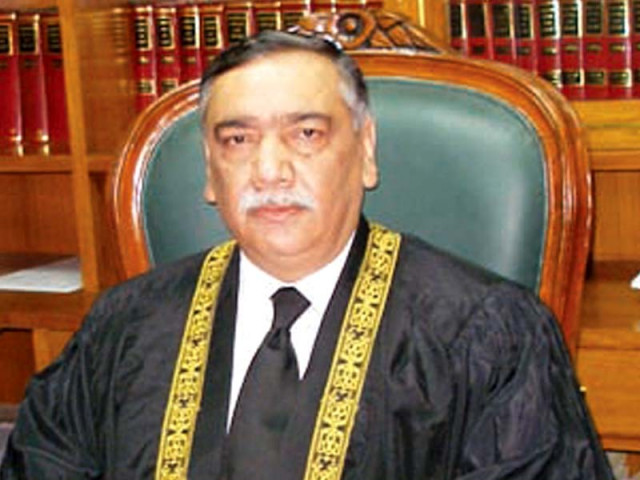Judicial vacancies to blame for huge case pendency: CJP
Says pendency could be cleared in a few years if even a quarter of vacant posts are filled

Justice Asif Saeed Khosa.
The chief justice, who has previously stated his desire to bring judicial reforms in the country, explained that if 25 per cent of the vacant posts of judges were filled, pendency could be cleared in the next couple of years. The CJP lamented that there are only 3,000 judges against a population of 220 million and pendency has reached near 1.9 million cases.
However, CJP Khosa, while defending the judges' efforts to clear the backlog, said that 3.1 million cases were decided in the last one year.
He also gave a comparison between the Supreme Court of Pakistan, which disposed of 26,000 cases last year, and the Supreme Court of the United States which only decided 80 or 90 cases during the same period.
The chief justice was hearing a civil case on Friday when he made the remarks.
CJP's reforms agenda
Since his appointment as CJP, Justice Khosa has focused on bringing judicial reforms in the country. On a related note, the chief justice has summoned a meeting of the National Judicial Policy Making Committee (NJPMC) on March 11. All five chief justices of high courts are the members of the committee.
It is learnt that the committee will consider issues such as the establishment of model courts, which could conclude trials in criminal cases within a week. The NJPMC will also discuss the acute shortage of judges and staff in special courts.
An official at the Law and Justice Commission of Pakistan revealed that 1,388 different posts are vacant in the special courts. Also of note is that no drug court has been operational in the province of Sindh for the last one year, he added. The official said that despite several reminders, provincial governments are not filling vacant posts in the courts.
CJP calls for updating existing laws
According to the NJPMC agenda, the committee will also discuss the implementation of police reforms committee recommendations.
Pendency decreasing
The pendency of cases has visibly decreased in the short time CJP Khosa has been in charge. On December 31, 2018, the total pendency of cases was 40,535, which has been reduced on 37,943 on February 15. A special bench led by CJP Khosa is also hearing criminal appeals filed in 2018/19. Also, the chief justice has initiated actions against false witnesses in criminal cases.
During his tenure, neither has any constitutional petition been entertained nor has any suo motu being taken. Lawyers have also expressed satisfaction over the incumbent CJP's approach to bringing changes in the judicial system.
Full court meeting
During the full court meeting on February 6, CJP Khosa sought the views of other judges on how to ensure fast track disposal of cases in order to reduce pendency. According to the minutes of the meeting, a lengthy discussion took place on the issue of adjournments, handling of petitions, disposal of reviews, CMAs, categorization of cases, the imposition of costs on account of undue adjournments, disposal of service matters, civil suits, old cases, and freshly instituted cases.
It was decided that the five senior-most judges may identify categories of cases so that those could be fixed in benches to be headed by them.
Adjournments should be discouraged and, where appropriate, the court may impose costs to address the issue.
Review petitions will be fixed before the appropriate bench or judges in the week immediately following institution.
Limine (pretrial) control should be exercised at the petition stage in order to reduce the intake of cases involving no questions of law.
Likewise, the full court discussed the issue of writing judgments in cases of dismissals of petitions for leave to appeal. There was a consensus that since a petition is like an application, and if leave is refused by the court and the petition is dismissed in limine, a very short order should suffice so that the time of the court is not wasted. However, if the judgment of a lower forum is reversed, detailed reasons may be recorded.
The documents reveal that the full court has decided that in case the impugned judgment is maintained at the petition stage and grant for leave is refused, the briefest possible order may be passed.
Video link hearings
The court's IT director gave a presentation during the full court meeting on establishing video links for case hearings. The full court discussed the matter from various angles and noted that hearing of cases through video link will be a step towards setting up e-courts. It will help reduce the cost of litigation and precious time of the court, as well as the parties involved in the litigation and their counsels. The proposal to establish a video link system for hearing cases at the principal seat in Islamabad and the branch registries was unanimously approved, according to the minutes of the full court meeting.
A committee comprising Justice Mushir Alam and Justice Mansoor Ali Shah constituted for IT Affairs of the Supreme Court of Pakistan was also tasked with looking into the matter and recommending an appropriate solution. It was also learnt that LJCP has also started work to improve the automation system of all the country's courts.


















COMMENTS
Comments are moderated and generally will be posted if they are on-topic and not abusive.
For more information, please see our Comments FAQ